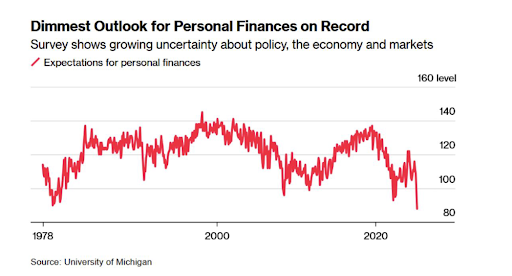| Subscribe Read in Browser |
 |
| Stat Of The Day |
| 19% |
Not to call you out, but according to a recent survey, only 19% of adults say they have a retirement strategy. If you’re part of the 81% without a game plan, it’s not too late. The first step is knowing where you stand. Find out with a pre-retirement checkup from HerMoney’s new, streamlined FinanceFixx program. Our first session kicks off on March 25th. Seats are limited, but you can score one by clicking here. Don’t forget to enter code SAVENOW for a special discount, just for HerMoney readers. |
|
|
|
| Welcome To The "F.U.D." Economy |
|
|
 |
The F.U.D. economy is here. We’re talking about an economy where Fear, Uncertainty and Doubt reign supreme. "Fear, uncertainty and doubt are panicking consumers, confusing businesses, paralyzing investors, and potentially impacting Washington policy-making," former assistant commerce secretary Bruce Mehlman wrote in his fab substack recently.
In this week’s InvestingFixx session, Jean broke down why some say we’re in the midst of a F.U.D. economy. One telltale sign: Consumer confidence is tanking. The University of Michigan’s Index of Consumer Sentiment recently fell 11% and consumers’ expectations for their personal finances dropped to the lowest level on record.
With the markets in flux, investors are worried, too. But, as an investor, what’s the right way to weather a F.U.D. economy? Don’t panic, and remember the old saying: Time in the market beats timing the market.
"[In InvestingFixx] We're learning how to pick stocks and pick companies that we think will be good for the long run and hopefully outperform," said InvestingFixx co-founder Karen Finerman. "I am certainly willing for my own portfolio to take that risk of underperforming in a down market and outperforming in an up market, to be able to own specific names that I think could outperform the market overall." |
|
|
|
| This Week In Your Wallet |
 |
Want to be more productive? Don’t worry about shutting that laptop at 4:30(ish) PM. According to a new survey, the average American workday wraps up at 4:39 PM – 42 minutes earlier than two years ago. "Despite the shorter workday, the data suggests that overall productivity has increased by about 2%," reports Bloomberg. While weekday hours have ticked down, the survey shows putting in work on the weekend has become more common. "Overall, people have grown more comfortable with flexibility, so many don’t mind leaving work early on weekdays and leaving the remaining work for weekends," Bloomberg reports.
Wait and see. That’s the approach the Fed is taking when it comes to interest rates. "Faced with pressing concerns over the impact tariffs will have on a slowing economy, the rate-setting Federal Open Market Committee kept its key borrowing rate targeted in a range between 4.25%-4.5%, where it has been since December," CNBC reported following Wednesday’s Fed announcement. While there’s a pause for now, reductions are expected at some point this year. "Despite the uncertain impact of President Donald Trump’s tariffs as well as an ambitious fiscal policy of tax breaks and deregulation, officials said they still see another half percentage point of rate cuts through 2025," notes CNBC. In addition to rate-related news, officials also said they now see the economy accelerating at just a 1.7% pace this year, down 0.4 percentage points from the last projection in December.
If you're looking to invest, you might be wondering, what's the difference between a Roth vs traditional IRA? The biggest difference between the two is the tax break. A traditional IRA offers a tax deduction on contributions (the Roth doesn’t). A Roth offers tax-free withdrawals (withdrawals from a regular IRA face income taxes). You could make a decision about which IRA is best for you based on that single piece of information. "For example: If you know you’ll be in a higher tax bracket in retirement than you are now, the Roth’s tax-free withdrawals are more valuable to you," explains Dayana Yochim. "If you’re in a high tax bracket right now or predict your tax rate will be lower in retirement, a traditional IRA is a good choice." |
|
|
|
| Things That Save You Money |
| ● |
I scream, you scream…we all scream for FREE ice cream. Head to Dairy Queen today for "Free Cone Day" and get a complimentary small vanilla soft serve. |
| ● |
Happy first day of spring! If yardwork is on your to-do list, check out ChipDrop. It matches people who want free wood chip mulch with arborists and tree companies trying to get rid of it. |
| ● |
Free and Harvard. Two words you probably weren’t expecting to see in a sentence. This week, the university announced no-cost tuition for families making under $200k. Students with families making less than $100k will have tuition and things like food and housing covered, too. |
|
|
|
|
| Hey You, Stop Stockpiling Eggs |
 |
Scrambled, poached, or over-easy — Americans love their eggs. While egg prices have gone down, the price of a dozen is still well over the long-term average of $2. Why have egg prices skyrocketed? What role does bird flu play? And is relief on the way?
On the latest HerMoney Podcast, Jadrian Wooten, Associate Professor of Economics at Virginia Tech, and Phil Lempert, the Supermarket Guru, crack open the real reasons behind soaring egg prices. They break down supply chain disruptions, grocery store pricing strategies, and what this all means for your wallet.
As for the cost of eggs, bird flu isn’t the only thing driving fluctuations. We have ourselves to blame, too. "Consumers who might rely heavily on eggs may be in a rush to go out and buy extra eggs, trying to think about what if it goes up again next week or the week after that," explains Wooten. "So, people are also stockpiling eggs, which is not helping the situation at all." |
|
|
|
| Ask Jean |
 |
| Q: |
I’m trying to save money and prevent food waste (which is essentially money waste). Are there different ways to buy groceries to help me save money and not throw food away? |
| A: |
Good question. We’ve covered this topic pretty extensively on the HerMoney Podcast. I’d recommend checking out this recent episode featuring Ali Slagle, the brains behind the Substack "40 Ingredients Forever." Slagle is a pro at using fewer ingredients in more ways, and shared with listeners her tips for creating a "capsule kitchen."
The savvy ladies of the HerMoney Facebook group (join us here), have thoughts, too: |
|
| ● |
"On Sunday, I go through my fridge and pantry and see what needs to be used and make a meal plan based on that," shares Kari. "I usually shop once a week on Thursday based on the weekly grocery sales." |
| ● |
"Purchasing on a store app and picking up orders prevents impulse purchases and saves time. There aren’t any temptations that can’t be unclicked before I finish my order," says Tamra. |
| ● |
Holly is a big fan of the Plan to Eat app. "They have a feature where I can plan my recipes on a calendar, then send my grocery list to the store I shop at," she says. While the app does have a cost, there’s a free trial, and as Holly notes, it’s usually on sale on Black Friday. |
| ● |
"We have an Aldi nearby where I buy most of my produce, bread, milk and eggs – that has helped!" says Ann. Btw, this Facebook group for Aldi fans is 3.5 million members strong and a great place to scope out highly rated products. |
| ● |
"I use the Flipp app. In the app, you create a list of items you frequently buy, and then it tells you if/when/where they’re on sale," says Courtney. |
| ● |
"I go to Costco on a quarterly basis and Trader Joe's once a month," says Margi. "Fresh food is bought weekly and daily. I have a CSA for fresh food, too." |
|
Submit your questions to Jean here.
|
|
|
|
| We maintain a strict editorial policy and a judgment-free zone for our community. We strive to remain transparent in everything we do. Website posts and newsletters may contain advertisements, links and mentions of products from our partners. Learn more about how we make money. |
| *This is a sponsored post |
|

